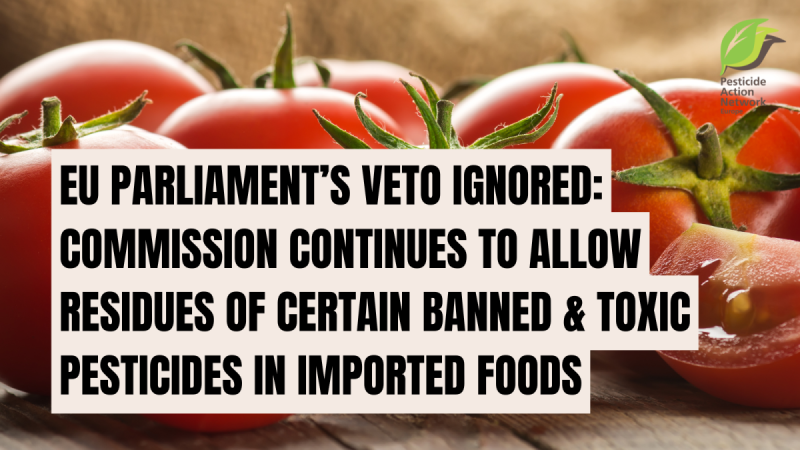The European Commission is ignoring an EU Parliament veto. Last September 2024, the Parliament took a strong stand by vetoing regulations that allowed residues of three toxic EU-banned pesticides in imported food products. Despite this, the Commission now proposes to allow residues of another ‘toxic to reproduction’ pesticide, isopyrazam. PAN Europe has urged the Commission and Member States to end these unfair trade practices. They compromise the health of both European consumers and citizens and farmers in third countries, where these dangerous pesticides continue to be used. Eliminating such double standards should be a cornerstone of the new EU Vision for Agriculture and Food.
On 18 September 2024, the European Parliament overwhelmingly rejected two Commission regulations that would have retained in some imported products the Maximum Residue Limits (MRLs) of three EU-banned and hazardous pesticides: carbendazim, thiophanate-methyl, and cyproconazole [1]. These substances are not approved for use within the EU due to their serious health risks. Parliament’s message is clear: no residues of these substances should be tolerated in food consumed in the EU [2].
This is not the first time the Parliament has intervened against such double standards. Earlier in 2024, Parliament successfully stopped the Commission from allowing residues of the ‘reprotoxic’ neonicotinoid pesticide, thiacloprid, in imported products [3]. This time, however, the Commission has stated that it does not intend to follow the Parliament’s request.
The Commission’s Stance: Ignoring Parliament’s Veto
Instead of responding to the EU Parliament’s veto with stronger protection, the Commission has indicated that all the existing MRLs will remain in place, allowing residues of these harmful substances not only in some but in all food imports [4]. While the Commission is not legally bound to follow the opinion of the Parliament, PAN Europe has written to the Commission to express its profound concern over this decision, urging it to respect the EU Parliament’s request and eliminate all residues of these banned substances [5]. The Commission’s inaction undermines consumer safety and contradicts the requirement under the Pesticide Regulation 1107/2009 that mutagenic, reprotoxic and endocrine-disrupting pesticides meet the “cut-off criteria” and should not be detectable in EU food.
The Problem with the Commission’s ‘Risk-Based’ Approach
The Commission relies on the European Food Safety Authority (EFSA)’s risk assessment, which sets ‘safe’ exposure thresholds for residues of hazardous substances. However, EFSA’s risk-based method does not ensure that adverse effects will not occur at lower levels as it neglects the combined effects of different pesticides and potential non-investigated adverse effects. For carbendazim, for instance, independent literature shows that the substance may have an impact on the gut microbiome and inflammation at a much lower concentration than the one considered safe by EFSA.
The Commission’s ‘Risk-Based’ Approach Continues with Isopyrazam
Adding to these concerns, the Commission put to the vote of Member States a proposed Regulation -pending for over a year- allowing residues of isopyrazam in imported foods [6]. Isopyrazam is another reprotoxic pesticide, which was banned in the EU in 2022. This move further highlights the Commission’s disregard for the EU Parliament's veto. It shows that the Commission continues carrying out a risk-based approach that seems to prioritise trade considerations over health protection and fair trading practices for EU farmers.
This double standard is both unethical and dangerous. Hence, PAN Europe wrote to the Member States asking them to reject this Regulation [7]. If adopted, this Regulation would result in isopyrazam residues being permitted in imported foods such as pome fruits, carrots, tomatoes, eggplants, and wheat—products, which are also cultivated by European farmers. This would compromise not only consumers’ safety but would also create a competitive disadvantage for EU farmers, who can no longer use this pesticide domestically, for good reasons.
Notes:
[1] European Parliament blocks residues of hazardous pesticides in imported food | PAN Europe
[3] EU Hypocrisy: allowing banned pesticides in imported food endangers all | PAN Europe
